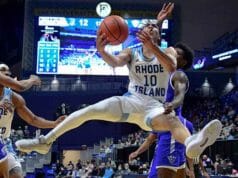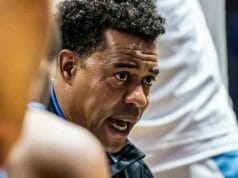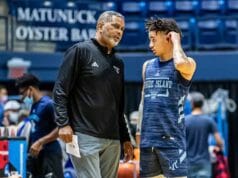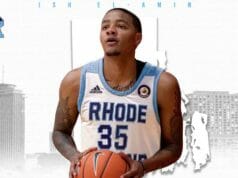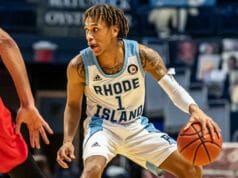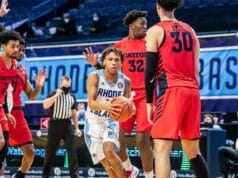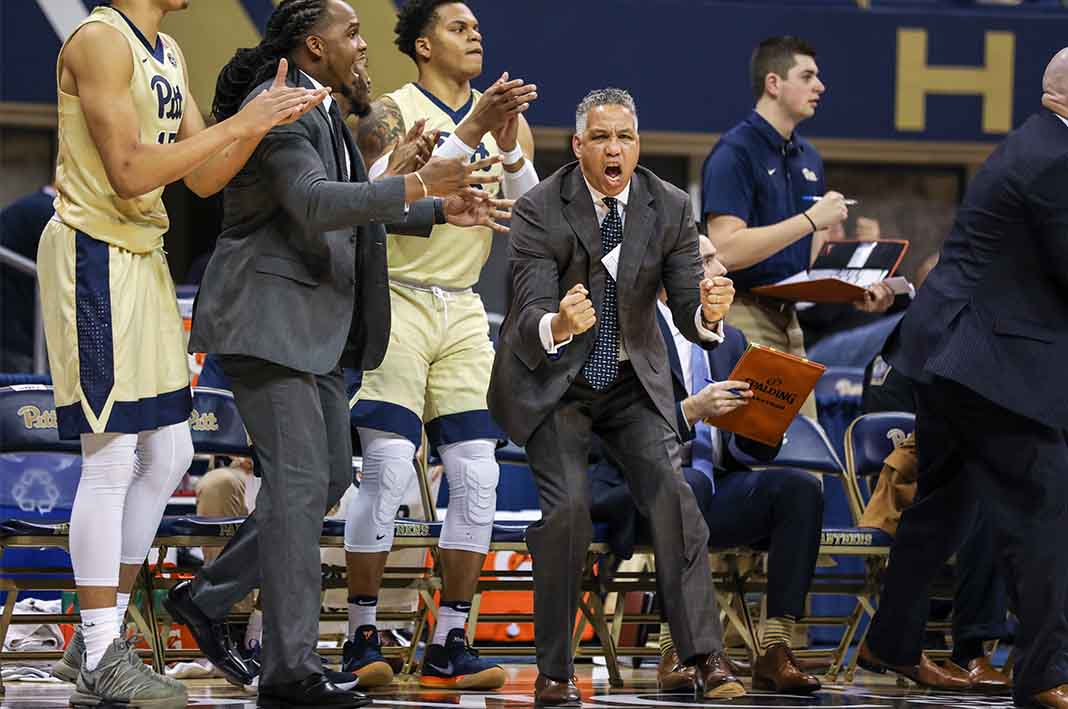
University of Rhode Island head coach David Cox recently announced several additions to his staff, among them Kevin Sutton, a well-respected coach and terrific teacher of the game. Sutton brings over three decades of experience across the elite high school, major college, and USA Basketball/international levels to the program.
Atlantic 10 analyst and Yurview contributor Chris DiSano, who has known Sutton since the latter wrote as part of College Chalktalk’s National Coaches’ Diary Series several years ago, caught up to chat about his move to Kingston.
Chris DiSano: Welcome to Rhode Island. How are you settling in and what are your impressions your first few weeks of living in the Ocean State?
Kevin Sutton: I’ve really enjoyed traveling around Rhode Island since we’ve been here. It’s a really nice state; beautiful. My family has adjusted rather quickly to the area, living in Jamestown and it is a beautiful place. My wife and I have been able to do a lot of different things. We’ve been over to Newport and have been able to take the scenic route, spend time in Narragansett and near the water. We’re excited to be here, excited to be a part of the basketball program at Rhode Island, and certainly I’m excited to work with David Cox and help him build the program that he’s always envisioned in his mind.
CD: What attracted you to this program and opportunity?
KS: David Cox, first and foremost. It’s been great watching him successfully navigate his career. I’ve had the opportunity to know him for many years. I’ve watched him grow up as a player at William & Mary, as an administrator, and watched him break into the coaching ranks at the high school level and with the DC Assault AAU program. I’m a little older than him, so I’ve had an opportunity to observe him from a distance. I’ve always been very impressed with him and how he’s handled himself in a professional manner. What’s interesting is I’ve also “followed” stops in his career in certain respects: He went to Georgetown University and then I did, he was at University of Pittsburgh and then I was there, so it’s been an interesting connection between David and me for many years.
As far as the program, Danny [Hurley] along with David’s assistance, built a very good program that is used to winning and they do it the right way. It’s led to Atlantic 10 championships and postseason play, so it’s been something I saw from a distance. Coming here now I can see why, because the administration is totally committed to the men’s basketball program.
CD: You’ve had success at various stops in both the college ranks and in other capacities. As far as your college stops, can you share a couple of key takeaways?
KS: I’ve been very fortunate in my coaching career that’s now spanned three decades to work for, and work with, some outstanding coaches. Some of my key takeaways have been how to manage a team… whether you win or lose, how to manage and move onto the next game.
I’ve learned a great deal about offense from guys like Kevin Stallings, how to be able to attack opponents via dead ball situations/out of bounds plays.
John Thompson III and the whole Thompson family showed me how to run a program from top to bottom. I’ve always said that John was a guy who had the challenge of having to pay homage to the past, because the past was present every day… and he did a great job paying homage to the successful program that his father built and his brother played in but also put his spin on the program and was successful. He took teams to the Final Four and postseason play… that’s what I learned from him.
CD: As far as your high school experience, what did you learn on the other side of the coin that aids you in understanding how to effectively recruit to the college level?
KS: First of all that’s a great question… I played at a nationally-ranked program, Flint Hill, for a high school hall of fame coach in the Washington, D.C. area in Stew Vetter… then came back and was an assistant for 10 years and built programs and was with teams that were nationally-ranked and that won national championships. Then I was fortunate to be able to build nationally-ranked programs of my own and win championships at Monteverde – and being on the high school side, it prepared me for being a collegiate coach. You have to be able to manage all aspects of the program. Now being on this side as a collegiate coach, I can look back, examine what I did as a high school coach and have that experience serve me well.
One thing coaching high school did was give me a great deal of understanding how recruiting should be done. My job as a high school coach was to provide as much information about the programs recruiting my kids to those kids and sometimes to run interference. Even if a kid is being recruited by 100 schools, at the end of the day he can only go to one of 100… and I always tried to function as a buffer to help kids enjoy the high school experience. That understanding helps me now being on the college side. I also coached many kids from who came here from other countries and I took a great deal of pride in functioning as a parent for them here in the U.S. and tried to help them make their own decisions. So I tried to help provide an educational buffer and assist throughout the process.
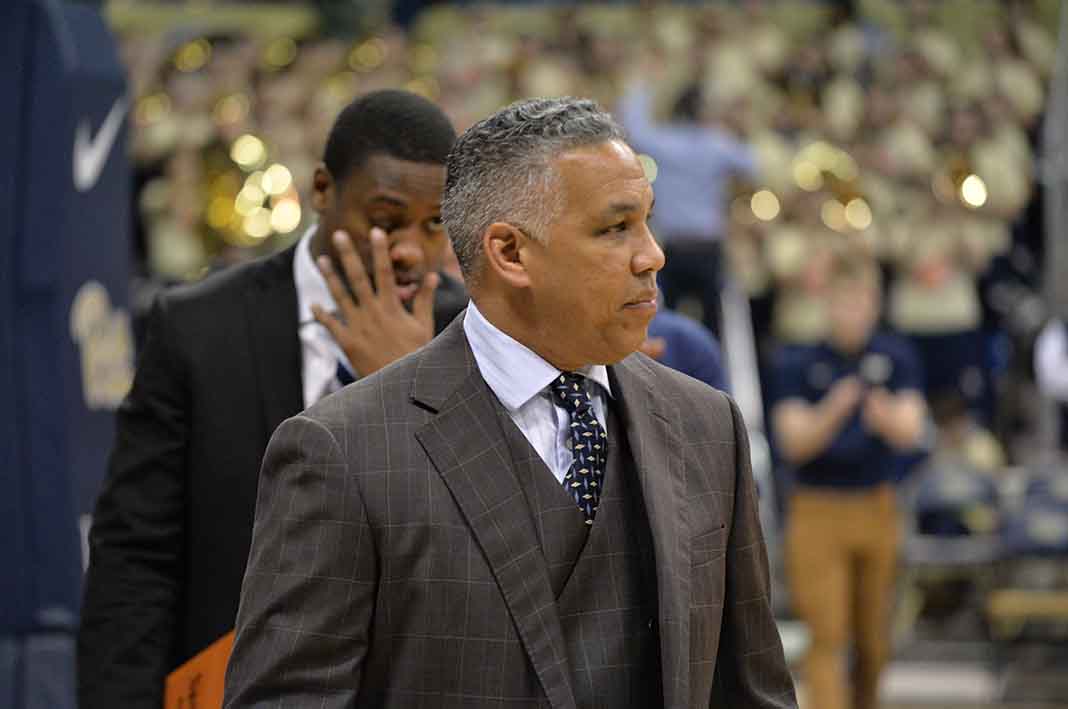
CD: Can you discuss your involvement with USA Basketball and how it’s helped mold who you are as a coach?
KS: I tell people all the time that my USA Basketball experiences are, without question, the absolute best experiences I’ve had throughout my basketball coaching career. Being affiliated with USA Basketball has been a tremendous honor. It’s very interesting to play internationally and when you hear the national anthem played, it helps you understand that we live in a great country. Also, it was eye-opening for me to see how international players on junior national teams were likewise so honored to play for their countries. It’s been a great learning experience. I think USA Basketball will continue to grow the game the right way and try to unify the game from a rules perspective too so it can be a more fluid game from the grass roots level up to, eventually, the pros.
I got a chance this year to speak this year – three different opportunities – in their lecture circuit in their Coaches’ Academy and help grow the game of basketball the right way. I’ve spent 10+ years and it’s been a tremendous experience and initiative that’s impacted the game globally. To see the players who were on that first team, to see them now… guys like Andre Drummond, James Michael McAdoo, Bradley Beal, Johnny O’Bryant, Quinn Cook, Michael Kidd-Gilchrist, Chasson Randle, and so many other guys that I know I’m leaving out… it’s been a great ride. People don’t even know this, but the General Manager for the Cleveland Cavaliers, Koby Altman, was our video guy for that team.
CD: What impresses you about Coach Cox ?
KS: I’ve always been impressed with him as a person. He’s a professional. He cares about his players, student-athletes. Students first and athletes second. He graduated from William & Mary so education has always been important to him. He places a high value there and in having his players ready. That being said, his basketball acumen… he’s been around great coaches and developed great players. And I’ve observed him and competed against him at St. John’s — spending time opposite him in the WCAC, arguably one of the top high school leagues in the country. So I’ve always had a great deal of respect for Dave, his ability to teach, and basketball knowledge. A lot of people don’t realize that when he was with the DC Assault he had Chris Wright, Dante Cunningham, Michael Beasley and others who are all households names now… but he had them when they were young and weren’t household names.
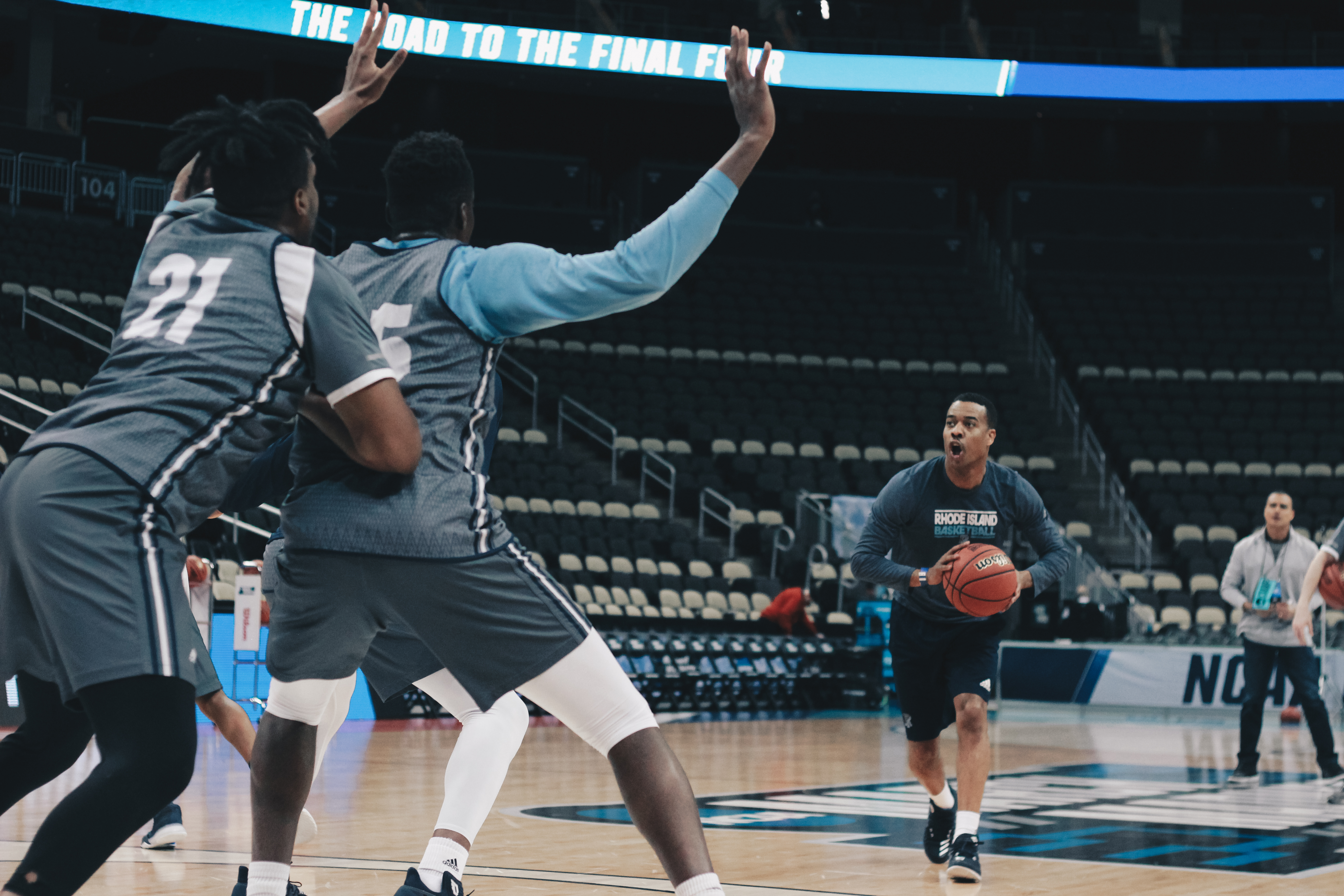
CD: We know that surrounding oneself with intelligent staff members is ideal… but so many unseasoned leaders avoid that approach. What does it say about Coach Cox that he’s not afraid to slot people with considerably more years of experience in the game around him?
KS: He’s secure with who he is as a person, as a coach, and where he wants to take this program. Let me give you an example of how this would manifest on the court… let’s say there are two shooting guards going for the same spot and they going to settle it with a shooting competition. You want to beat the player you’re competing against at their best. So if you’re a secure player, you’d say to the other player “Where do you want the ball?” And then that secure player would pass the ball to the guy he’s competing against right where he wants it, right on target, every time because he wants to be successful and because he’s confident in his ability that now, when it’s his time to shoot, he’ll receive the same type of passes. So that’s why I say that being secure is very important. We want our team to be a team of secure players. That’s what you see with David Cox. He’s secure in who he is so he’s surrounded himself with people to fill in gaps; a very good coach who has potential to be an outstanding coach.
CD: You’ve developed a penchant as an extremely well-rounded coach, from tactician, to player development, to recruiting… Is there a particular facet you enjoy and in which area have you grown the most recently?
KS: Much like with my players, I’ve never wanted to be one dimensional. I never wanted to pigeonhole as just a recruiter, just a scout, someone who ‘can only work with the guards.’ So I’ve always tried to dive into all aspects. I’ve learned in all those areas about the game of basketball, but if I had to pick one area I’d say player development because I’m passionate and I love seeing the growth and development in players’ games and as men.
As far as an area of personal growth, that would be my defensive understanding over the years. Defense was an area early in my career that I didn’t place a high value on, so in the last eight years or so, I’ve placed a premium on getting better in both understanding and teaching defenses because the game continues to evolve. So defensively I’ve continued improve and get better so I can help make my teams better and help develop the players so when they leave for whatever their next level is, they’re prepared.
CD: As you observed this Rhode Island program over the last couple of years, what resonated with you the most?
KS: I watched Rhode Island for the last two years from afar; twice they came to Pittsburgh: for the Atlantic 10 Tournament and I watched them play in and win that; and then they came back to play in the NCAA region this past season. Subsequently, now that I’ve taken the job I’ve watched a ton of film and every game they played the last year or so.
The thing that jumped out to me was that there were multiple players that I call “shot-clock players.” Players that were willing to take the big shot or make the big plays, who understand the magnitude of the moment they were in… and never wavered, or flinched, or were never fearful. Very confident. Multiple players, not just one, who would make a play whether it was shooting the ball, making the right read, right pass, or on the defensive end… making the right defensive play, rotation, whatever was called for. The kids were/are mentally tough-minded.
CD: You arrive at Rhode Island and walk through the doors. What did you observe culture-wise?
KS: Well, first of all there is a culture. The word culture is a buzzword in sports today, but when I walked in here at URI to this program, there was a clear culture of work-ethic. Everyone is very competitive, taking a great deal of pride, coming in and putting in the time… later, after workout and getting extra shots on their own. I’ve walked into a situation where culture is well-established. It’s not being established. It’s well established. And the expectation level is set and people now, particularly the freshmen, are learning how to work smart, not just work hard. It’s going to serve them well. This foundation, the culture here, is that of a working-class, grind it out type of culture.
CD: How have summer sessions been going?
KS: We’ve had our whole team here and the sessions have gone well. The freshmen have been acclimated to college life and college athletics and it’s going to serve them well because they’ve been able to be coached by the staff that’s going to coach them during the regular season. And they’ve been able to compete against and develop relationships with their teammates. There’s a comfort level.
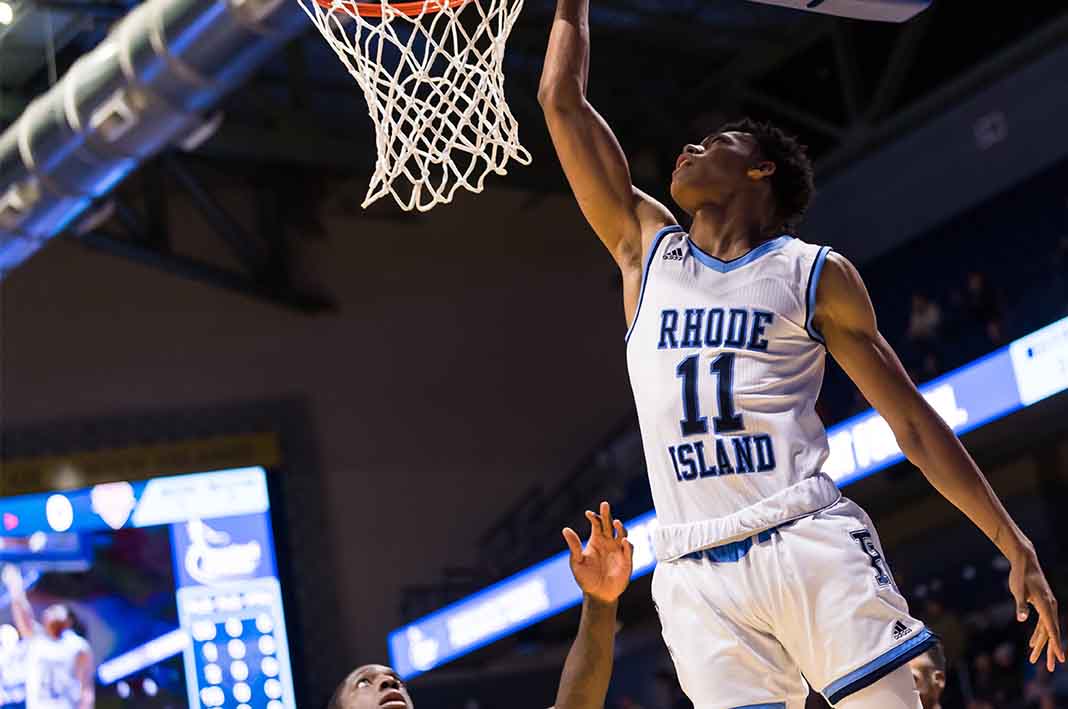
All the guys are working extremely hard, but I would say Jeff Dowtin is ready to take a quantum leap forward in his leadership and also his play. Fatts Russell is a rising sophomore and is ready to step up. Christion Thompson is playing well, and, after not playing last year, this is a big year for him… we’re expecting good things from him. Everyone… Cyril has come back strong and is competing. His physicality is going to be very important to our success this year. The previous staff put together a very good recruiting class: the freshmen, Jermaine Harris, Tyrese Martin, Omar Silverio, and Dana Tate… they’ve all come in and acclimated themselves. Everyone has been working hard.
CD: Many are excited about Fatts and Jeff playing together as mainstays in the back court. What are your early impressions?
KS: They’re both talented in their own ways. Fatts is Philly… a speed game. It’s not a coincidence that Allen Iverson was his favorite player. He can play with the ball in his hands and can make plays – a good passer with great vision – but he can also take and make big shots. So he can slide over and play off the ball. That makes for our back court with he and Jeff both able to play with or without the ball, in the era of small ball, you need to have that. You need to have multiple players who can handle the ball, score the ball… so it makes it that much more difficult for the defense because they can’t just lock you. These two guys playing together, I’d venture to say they’ll be a formidable back court in the Atlantic 10.
CD: We go back to the College Chalktalk days 7-8 years ago and also share the same alma mater, you in ’88, me in ’98. So let’s wrap it here… is James Madison going to knock off NC State in football on September 1st?
KS: You know what, I think that without question it’s something we need to do. I think sometimes people forget that we’ve had a very successful run in football. I went to school with Charles Haley who played and won five Super Bowls, and Gary Clark who also won one, Scott Norwood was the placekicker. They’ve had a great run historically.
These days administratively, the university has supported the program, poured money into the stadium. I’m just really pleased as an alum that things are going as well as they are, with a national championship and runner-up recently. So I think we need to go in and knock off NC State [laughs].


